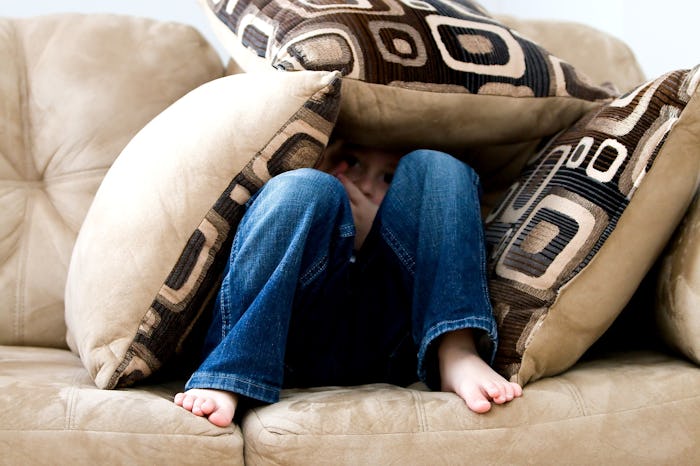It's that parenting conversation everyone desperately hopes to avoid forever. No, I'm not talking about the birds and the bees (although, yikes). I mean explaining the concept of death to your precious, innocent little minds. Most parents I know wish they could shield their children from the pain and disillusionment that come with this topic, but that's not reality. Whether you've lost a relative, a pet, or the concept has come up in some other way, all families are forced to learn how to talk to your kids about death. Eventually, they'll have to know and you want to make sure you're doing it right.
Dr. Jarrett Patton, a Fellow of the American Academy of Pediatrics, advises parents to start with the big picture. The world can be a big, scary place for kids and when death affects their little lives directly, those feelings are legitimately intensified. It may help to begin the conversation with your child by talking about the life cycle of all living things, starting with plants, and working your way through animals and human beings.
"Death can be a traumatic, yet unavoidable concept for children," Patton tells Romper in an exclusive interview. "Parents should begin conversations around death by explaining the life cycle. Let your child understand that death is the natural end point to life."
With the foundation of a life cycle, most children are likely to understand and accept the natural death of an elderly adult in their lives, such as an aged and ill great-grandparent. But as is true for all of us, unexpected or young deaths may rock their worlds much more acutely. And when it comes to the death of a household pet, it's important for parents to recognize that our children might feel much closer to their cat than they do to a relative whom they see only a few times a year.
But death is death, and often inexplicable levels of stress manifest that might be different than what you expected (true both of children and adults). Patton acknowledges that for a child, "There can be particular stress around unexpected deaths of a close family member or pet. In these circumstances, it is important to explain that these events don't happen often, but can be sad when they do occur."
Don't underestimate the model that you set for your children, especially in times of crisis or grief. Talking about the value of feelings and letting your child know that their emotional responses are natural can help their young minds organize their experience. Patton believes that if a parent feels emotionally prepared to do so, discussing your own feelings about the death can help your child process her experience.
So how do you know if your child's response to death is healthy or not? The key, Patton tells Romper, is to give it time to let the dust settle. "Your child may be sad for a short time after the death, but should return back to their normal self," he says. "If you feel that your child is having a particularly tough time adjusting to a death, be sure to have them see a counselor and their physician."
Since children are still learning how to verbally express their feelings, a continued struggle to accept this death may manifest more in their behavior (either more aggressive or more withdrawn than normal) rather than their words.
With plenty of empathy, comforting conversation, and understanding, most children will naturally move on after processing death. Some parents may want to take the opportunity to tie in the family's religious beliefs, particularly about death and the afterlife, but some may choose not to. However your unique family handles this difficult time, the most important thing is that you're doing it together.
Check out Romper's new video series, Romper's Doula Diaries:
Check out the entire Romper's Doula Diaries series and other videos on Facebook and the Bustle app across Apple TV, Roku, and Amazon Fire TV.
